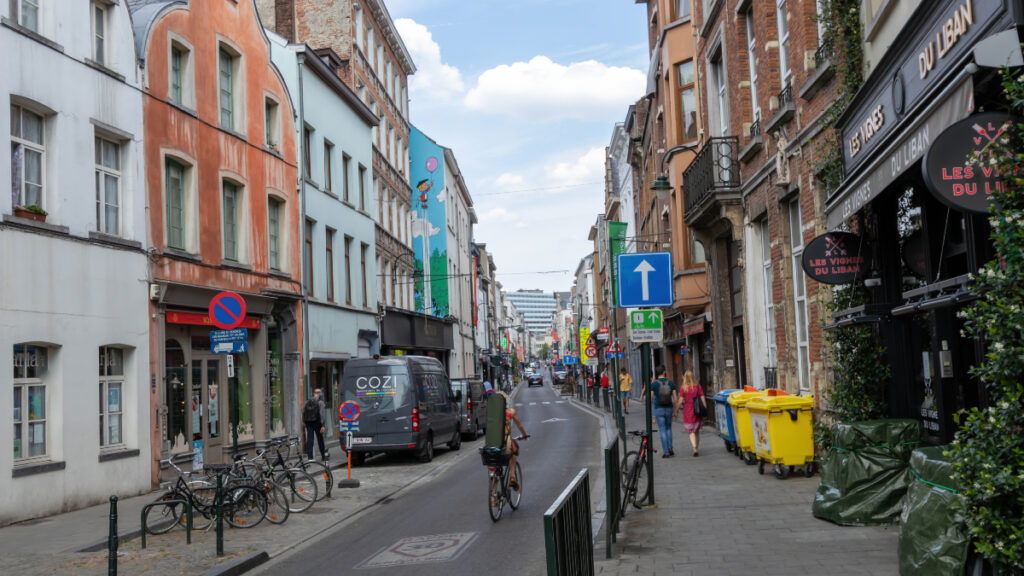Has Brussels got better or worse in the last five years?
This question won’t be on ballot papers Sunday when voters in Brussels elect a new regional parliament. But how they answer this crucial question will decide who governs the capital for the next half decade.
I believe Brussels is a better city now than when the current coalition of socialists, greens and Dutch-speaking liberals took power in 2019. As I argued in a previous column, it is more open, international and self-confident. With its new pedestrianised squares, bike lanes and car-free streets it is also a more liveable city, as polls prove.
This is partly due to Good Move - which has been a good move for Brussels. The controversial mobility policy, which is violently opposed by a vocal minority of residents, aims to restrict through traffic in residential areas and create a more liveable environment for locals.
New data shows it has succeeded beyond all expectations, at least in the centre of Brussels. There is a quarter less through-traffic than two years ago, over a third more cyclists, 20% fewer crashes, less noise and better air quality. Even its effect on local business has been positive, with purchases up 10%.
Despite this, the socialist PS, the liberal MR and the far-left PTB - the three parties topping the polls ahead of elections Sunday - have either been busy campaigning against the measure or lobbying to water it down.
“Brussels deserves better than to be a laboratory of ideologues,” MR lead candidate David Leisterh said in a recent debate. This is ripe coming from the French-speaking liberal party, which is ideologically pro-motorist and against almost all attempts to calm car traffic in one of Europe’s most clogged and polluted cities. In a recent analysis of parties’ mobility policies, the road safety group Heroes for Zero found that the MR is opposed to a kilometre tax aimed at cutting congestion in the city, a points-based licence that would stop repeat offenders driving and measures to curb SUV use in the centre.
But most astonishing of all is the MR’s opposition to ensuring the 30 km/h speed limit - which was introduced four years ago - is actually applied. At present, in a classic Belgian compromise, police forces have a ‘margin of tolerance’ allowing motorists to drive up to 47 km/h without getting fined. Every political party wants to reduce this, except the MR and the far-right Vlaams Belang party.
Let’s be perfectly clear what this implies. If hit by a car at 50km/h, a pedestrian has a 50% chance of dying. At 30km/h, the same pedestrian’s chance of dying is down to 0-5%, according to Heroes for Zero. So MR is basically running on a policy of tolerating more road deaths – and deaths by traffic pollution for good measure.
The MR’s mobility policy is perhaps predictable for a centre-right liberal party whose national leader is an avowed car-lover. But for the socialist PS to resist so many tried and trusted traffic-calming measures is bewildering, especially because it grudgingly greenlighted Good Move in government. “Good Move has failed,” said Ahmed Laaouej, the socialist candidate to become regional president. “Mobility should be with the people of Brussels, not against them,” he added pledging to completely review the measure.
Yet the socialists’ transport policies act against the people the party is meant to represent. Over half the households in Brussels do not have a car. And in poorer districts like Saint Josse a staggering 70% do not have one. Despite this, the PS and far-left PTB are against a kilometre tax, reducing parking spaces and dissuading SUVs in the city.
So the very parties that are supposed to represent the poor support richer people driving in from Brussels’ more affluent suburbs - often in gigantic SUVs - polluting areas where most people don’t own cars, parking on streets where most people don’t own cars and often causing accidents on roads where most people don’t own cars. Not a good look for ‘progressive’ parties.
Of course, mobility isn’t the only problem the next regional parliament will have to deal with. In a recent study, 45% of Brussels residents said they felt unsafe in the region, a problem that has been exacerbated by a spate of recent drug gang shootings. Homelessness has risen dramatically in recent years, with almost 7,000 people living on the streets. Poverty and youth unemployment are scandalously high for one of Europe’s richest regions. The city is dirty, partly because of a waste collection policy that amounts to tossing stinking plastic bags onto pavements. And the way the city is governed, with 19 mayors for a city of 1.2 million people, is infuriatingly inefficient.
If you think these problems are the major ones Brussels faces and life in the capital is getting worse, then it makes sense to vote for opposition parties. Just be careful to read the small-print – especially when it comes to mobility.
However, if you believe Brussels has become more liveable in the last five years and deserves better than a return to noisy, dirty, car-choked streets, cast your ballot for a party in the governing coalition – especially those not threatening to roll-back some of the good moves the city has made.


